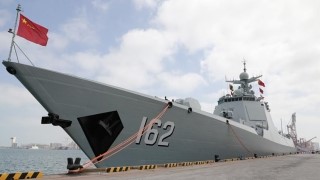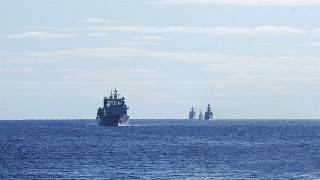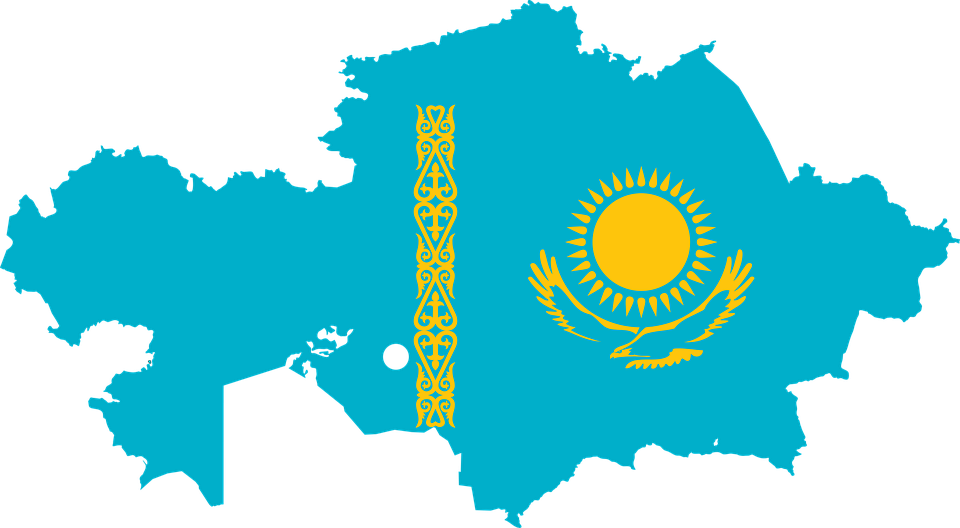Listen to our latest radio broadcast at https://drive.google.com/file/d/1N7AxU0gnPEOjOrb8jN9F9PzDLSDUFpZL/view?ts=642dce49
Our Latest Radio Broadcast


Listen to our latest radio broadcast at https://drive.google.com/file/d/1N7AxU0gnPEOjOrb8jN9F9PzDLSDUFpZL/view?ts=642dce49

Watch our latest TV program at https://rumble.com/v2gfgeo-the-american-political-zone-april-4-2029.html

Alarm bells are being run over the Biden Administration’s proposed defense budget, in significant part due to its failure to allow the Navy to maintain an adequate deterrent against China.
The problem is not new. Last year, Biden’s budget released last week called for a net loss of 15 ships. According to a Wall Street Journal review, to coverup the shrinking force, “The Navy is essentially double-counting a ship Congress already authorized, so at eight new ships the Navy adds one for every three it would scrap.”
The move comes at an exceptionally perilous time. Already, the U.S. Navy has lagged behind China in the number of ships, with Beijing floating 355 to Washington’s 298. China is continuing to rapidly grow its force to over 460, while America’s continues to shrink.
According to the Chairman of the House Armed Services Mike Rogers (R-AL) in a 2022 National Review interview
The Biden administration’s 30-year ship-building plan also reduces the Navy’s ability to protect its aircraft-carrier strike groups and eliminate enemy minefields, reduces the Marine Corps’ ability to conduct forcible-entry missions, and reduces by almost 10 percent our Navy’s capacity to launch missiles. Public estimates indicate that China will eventually develop a global force of submarines capable of launching ballistic missiles, posing an obvious risk to the U.S. And China’s surface-combatant forces already greatly exceed ours. It is unsettling, to say the least, that the Biden administration is shrinking our naval force under these circumstances…
What’s worse is that China knows we are set in our ways. Former and current American Pacific commanders have indicated that maritime conflict with China could occur within the next five years — yet our Navy appears inclined to pursue a strategy that wouldn’t make it capable of meeting the Chinese threat for another 20 years. China’s regional ambitions pose one of the toughest national-security challenges America has faced in decades.”
Beijing’s aggression is not theoretical, and is not restricted to its armed designs on in invading Taiwan.
In March, reports Radio Free Asia, “The Philippine Coast Guard (PCG) on Saturday spotted more than 40 Chinese vessels near Pag-asa, one of the islands occupied by Manila in the South China Sea. Coast Guard personnel stationed on the island – also known as Thitu – reported a People’s Liberation Army (PLA) Navy vessel, a China Coast Guard (CCG) vessel, and 42 suspected maritime militia vessels, anchored within 4.5 to 8 nautical miles of the shore. The PCG said this was ‘clearly in’side the land feature’s 12-nautical mile territorial sea.”
Beijing’s challenges didn’t end there, Radio Free Asia continues. Beijing’s maritime forces then “swarmed” into Vietnam’s exclusive economic zone, a move reminiscent of China’s invasion of a similar zone in the Philippines during President Obama’s tenure, an aggression all but ignored by that former White House.
As the Heritage Foundation has pointed out, “the Fiscal Year 2018 National Defense Authorization Act, Congress stipulated to have “…as soon as practicable, not fewer than 355 battle force ships….” However, Biden’s budgets actually shrink the Navy’s size. Unsurprisingly, Congressional reaction to the proposed budget has been swift. Sen. Jim Inhofe (R-Okla.) called out the potential violation of the law. Navy vet and Rep. Elaine Luria (R-Va.) struggled to refrain from salty “sailor” language in expressing her disappointment.
In remarks to a conference on November 3, 2022, Admiral Charles A. Richard, commander of U.S. Strategic Command, stated “As I assess our level of deterrence against China, the ship is slowly sinking. as fundamentally they are putting capability in the field faster than we are. As those curves keep going, it isn’t going to matter how good our [operating plan] is or how good our commanders are, or how good our forces are—we’re not going to have enough of them. And that is a very near-term problem….”
Photo: Following the consensus reached by the militaries of China, Iran and Russia, the navies of the three countries held the Security Belt-2023 joint maritime exercise in the Gulf of Oman from March 15 to 19. (China Defence Ministry)

In New York City, crime in general has surged 31percent, and murder is up 34 percent. The two key figures in NYC law enforcement, NY State Attorney General Leticia James and Manhattan District Attorney Alvin Bragg, however, are more concerned with a political prosecution of political opponents than they are about keeping the citizenry safe. Indeed, they both campaigned on promises to “get” Trump.
But their obsession with Trump is not their sole reason for ignoring violent crime. Similar to other progressive elected officials, they see their mission not to do the specific job they were elected to, but to promote a hard-left agenda, one that frequently runs afoul of existing law, the Bill of Rights, and the Constitution.
One of those drives is the elimination of of the right of self-protection. There are ample examples of this. As reported in the New York Post, A Manhattan parking garage attendant was shot twice by an alleged thief. In self defense, the worker wrestled the weapon away from the assailant and shot him. Bragg’s office chose to prosecute the innocent worker.
It’s a familiar story in progressive jurisdictions. In a previous example, a NYC deli worker was attacked by a thief. The worker protected himself with a knife, stabbing the criminal. The worker was arrested and temporarily incarcerated until an enraged citizenry forced his release.
The Post notes the impact of Progressive DA Bragg’s obsession: “Bragg’s office wins a conviction just 51% of the time” when it prosecutes serious felony charges — “down from 68% in 2019 [under DA Cy Vance], the last year before the pandemic disrupted the court system. Bragg’s own decisions clearly drive much of the troubling data: His office has downgraded 52% of felony cases to misdemeanors, vs. 39% in 2019. The office under Vance from 2013 onward never downgraded more than 40% of felony cases.
NY State Attorney General has expressed concern with many things, including “getting” Donald Trump, and complaining that a local sports team’s game wasn’t televised. Unfortunately, fighting crime does not appear to be a major worry for her.
Self-defense and individual rights are the essence of America. The earliest settlers came here to escape the tyranny of their home governments in Europe. The Minutemen at Lexington and Concord, where the battle that began the American Revolution was fought, were attempting to shield their right to self-defense, both legally and in the ability to protect themselves from King George’s troops.
With the Revolution over and won, the debate over how to protect individual rights in the new nation began, eventually culminating in the Bill of Rights. The First Amendment provided for free speech, the Second Amendment gave the right to own weapons, the Fourth Amendment provided the right of privacy, and the Ninth and Tenth Amendments provided that those powers not specifically given to the federal government belonged to the people or the states.
Each of those safeguards has come under substantial attacks by the Left. Those who disagree with Progressives, particularly on college campuses, are frequently met with either verbal or physical violence.
Writers on social media who express conservative views, as has been recently exposed, face censorship due to federal pressure on those who administer those forums.
The explosive growth of the federal bureaucracy has made a mockery of the Ninth and Tenth Amendments.
To Americans, the existence and sanctity of personal rights are as common and permanent as the air itself. That assurance is increasingly unwarranted. There is determined political faction, growing ever stronger, that perceives the Bill of Rights as a roadblock to their dream of establishing an all-powerful central state that would determine every facet of life, from the rights to raise your children in the beliefs you hold dear, to even how you cook your food (seen in the attacks on gas stoves.) Self protection is the most central right, and, under people like Alvin Bragg, the most endangered.
Illustration: Pixabay

Listen to our latest radio broadcast at https://drive.google.com/file/d/1CZn1NSVbr9_FtR6xN-RUVTCOMcBSRSDR/view?ts=6424943d

Watch our latest TV program here: https://rumble.com/v2fd9re-the-american-political-zone-march-28-2023.html

The recent meeting between China’s strongman Xi and Russia’s Putin emphasized a disturbing reality: Americas enemies are coalescing into a solidified alliance aimed squarely at western interests, national sovereignty, and democratic principles.
Although it receives far less print space and air time than the latest Kardashian fashion statement, the reality that Russia, Iran, China, along with North Korea and Belarus are working closer together to establish a combined military threat is a reality that will imperil those that ignore it.
The U.S. Office of National Intelligence has reported that Moscow and Beijing are closer today than at any time in over half a century.
On the oceans, Moscow and Beijing are continuing to hold joint naval maneuvers. In December, the two nations conducted joint naval maneuvers. Iran is rapidly moving towards the development of atomic weapons (even President Biden has admitted that hopes of a nuclear deal are dead) and is assisting Putin’s Ukrainian assault by providing him drone weapons. Reportedly, Putin and North Korea’s Kim Jong-un have discussed ways to assist each other’s militaries. Belarus dictator Alexander Lukashenko is eagerly moving closer to joining Russia’s Ukrainian war, and is receiving advanced weapons.
The threat is not just on distant continents; indeed, it is close to home. Military Review notes that Russian military ties to Latin America have become a significant factor. Evan Ellis, CSIS Senior Associate, testified before Congress in July that:
“During the period from the lead-up to Russia’s unprovoked invasion of the Ukraine through the present, as in previous episodes of conflict with the West in the past 15 years, Russia has demonstrated its intent and capability, however limited, to conduct military and other strategic activities oriented against the U.S. and our partners in the Western Hemisphere. Its key vehicle for doing so has been collusion with anti-U.S. authoritarian regimes in the region, including Venezuela, Nicaragua, and Cuba. Recent demonstrations of Russia’s hostile intent toward the U.S. and our partners in the Western Hemisphere include Deputy Foreign Minister Sergey Ryabkov’s January 2022 suggestion that Russia might deploy military forces to Venezuela or Cuba, Deputy Prime Minister Yuri Borisov’s February 2022 signing of a pact to increase military cooperation with Venezuela,and Nicaragua’s June 2022 re-authorization for limited numbers of Russian troops and equipment to enter the country for training missions and other forms of support. Most recently, Russian actions also include announced participation by a team of snipers, along with teams from China, Iran, and seven other countries, in an upcoming military sniper competition in Venezuela, the first time the competition has been held in the country.”
Russia is not alone. China, according to Leland Lazarus and Ryan C. Berg of Foreign Policy have highlighted Beijing’s growing military relationships in the region. The Dialogue’s Latin American Advisor publication reports that:
“Chinese military leaders visited with their counterparts in Latin America 215 times between 2002 and 2019, according to a report released last year by the United States-China Economic and Security Review Commission. Chile, Cuba, Brazil and Argentina accounted for more than half of those visits, according to the report. Additionally, China and the CELAC bloc of Latin American and Caribbean nations last December agreed to continue collaboration on military issues through the China-Latin America High-Level Defense Forum.”
Air Force Gen. Glen D. VanHerck, commander, North American Aerospace Defense Command and U.S. Northern Command, and Army Gen. Laura J. Richardson, commander, U.S. Southern Command, testified before a Senate Armed Services Committee that China and Russia are looking for opportunities to undermine U.S. partnerships in the Americas.
At this point, there is no reasonable prospect that the growing relationship between Russia, China, Iran, North Korea and Belarus will not become more intense, or that their interplay in the Western hemisphere will become less dangerous.
Photo: Russia-China joint naval manuevers (China Defense Ministry photo)

Last September, for the first time in almost three years, Chinese President Xi Jinping traveled abroad. He chose to visit Kazakhstan, Uzbekistan, and attend the annual Shanghai Cooperation Organization summit where participant countries discussed regional security and development issues. Xi’s arrival stoked world media stories linking the trip’s significance to progress on China’s Belt and Road Initiative (BRI). Nine years earlier Xi had chosen Kazakhstan’s capital of Nursultan to announce the start of the BRI. There was a reason he picked a Middle Corridor country. China’s foreign policy leadership is strategic in its thinking and long-term in its approach.
Central Asia is a group of neighboring states that sit strategically between China and Europe. Using its trade routes enables China to export to Europe and bypass Russia. Kazakhstan is “ground zero,” according to one military analyst who called the region a potential flashpoint if the region leans to heavily in either China or Russia’s direction. Kazakhstan is performing a finely-tuned balancing act. It is an independent state formerly under Soviet control. Today the country supplies minerals, gas, oil, and metals to China and transships goods from China to Europe. It is a misconception, however, to simply assume the nation is now under China’s influence.
The country recently reached an agreement to export oil to Germany. Biz Media reports that after a couple of months delay KazTransOil delivered 20,000 ton of Kazakhstani oil in its first shipment. Although less than the 300,000 originally planned, the deal is significant. To enable this supply, Kazakhstan came to an agreement with Transneft, a Russian energy company. Flowing through the 2,500-mile long Druzhba pipeline, the Kazakhstani oil traveled through Russia, Belarus, and Poland before arriving in Germany, according to Nurbek Bekmurzaev’s Jamestown Foundation report.
One unknown since the deal was reached last December is whether Kazakhstan will now play a larger and more independent role in the European energy market. Kursiv Media earlier this year reported that the country’s oil exports to Germany in 2023 could reach almost 7 million tons a year. Russia will play an outsized role in the sale since it could decide to halt shipments through its pipeline to Germany. Putin still may terminate the agreement to punish Germany if it continues to support Ukraine’s war effort. Kazakhstani oil remains Germany’s cheapest solution to its energy needs.
Kazakhstan wants to sell the crude oil, which is similar in composition to what Germany has previously purchased. Officials in Nursultan recognize that its particular blend of crude saves Germany’s Schwedt refinery money as it can avoid costly adjustments to the refining process and the pipeline location is convenient. To ensure the integrity of the supply chain Nursultan government officials are carefully balancing Russian concerns over Germany’s support of the Ukraine war effort with its need for capital to develop the country. Analysts suggest the delay of the first shipment was due to an internal political balancing act by officials in Nursultan. “Small technical errors” were used as an excuse before the shipment was reduced in size to appease Russian concerns.
“Thus, with only a couple days left until the end of the first fiscal quarter, the modest amount of 20,000 tons exported instead of the projected 300,000 has cast doubt on the hopes that Kazakhstan could effectively rescue Germany and the rest of Europe in an energy crunch,” says Bekmurzaev. Kazakh officials have not forgotten that last year Russia shut down the Caspian Pipeline Consortium on several occasions, stopping its oil from reaching Europe.
Moscow lost valuable transit fees in 2022 and may not be in a position to lose them again this year. Nursultan officials acknowledge the country may not be able to fully supply all of Europe as its doesn’t produce enough oil. They are hoping the reduced supply of what they can ship will be more acceptable to Moscow. Kazakhstan’s President Kassym-Jomart Tokayev recognizes that Putin needs the cash revenue from the oil transiting Russia for its war effort. “Russia will retain some leverage over Germany by keeping it hooked on oil imports arriving via a Russian-controlled pipeline. Thus, while the oil itself will arrive from Kazakhstan, Germany will remain dependent on Russia at some level for supporting the exports,” says Bekmurzaev. He adds that keeping the Druzhba pipeline operational leaves the door open for renewed oil exports from Russia in the future.
China is the dominant partner in its relationship with Russia. When Putin went to war in Ukraine Beijing immediately filled some of the gaps left in Central Asia. Although BRI development projects have helped the region, Beijing has not been able to simply replace Moscow’s influence as suggested by some Western leaders. The situation is more complex. China and Russia, like NATO Member states, work closely together on some issues while disagreeing on others. The Middle Corridor is a complicated environment in which the Central Asian states play off the great powers to achieve their own end goals. Kazakhstan is using the geopolitical environment and the war in Ukraine as an opportunity to play a key role in the European energy market while also making sure to appease China’s leadership who come with regional aspirations and BRI money to buy their way into the transit corridor.
Daria Novak served in the U.S. State Dept.
Illustration: Pixabay

The Cold War may be heating up in the Arctic as China seizes the opportunity to take on a larger role with Russian fighting in Ukraine entering its second year. Since the start of the Covid pandemic, the Arctic Council has suspended its in-person meetings. Now with Russia about to rotate out of the chairmanship position on the Council, there is a renewed effort by China to occupy a more prominent spot in decisions over the future of the region. At the recent China-Russia Summit President Xi Jinping announced the establishment of a joint Chinese-Russian Working Group to evaluate development in the region along a new, proposed Northern Sea Route (NSR).
China experts from the Jamestown Foundation, speaking at a webinar on the China-Russia relations on Wednesday, concurred that the Xi-Putin bond is strong but not without its issues. The point out that in a reversal of roles occurring over the last three decades, China has emerged as the stronger and more dominant partner. China appears confident and aggressive in its foreign relations approach toward its ally. Recent Russian attempts to maneuver China into signing additional contracts to purchase Russia failed, leaving Moscow both surprised and concerned. Paul Goble, of the Jamestown Foundation, suggest that the Russian Federation believes China is now in a position to “elbow Russia aside not only along the NSR but across the Arctic more generally.” He says that one Russian observer on the “Captain Arctic” Telegram channel warns that “Putin’s misguided move has given Xi ‘the keys’ to the Arctic and pushed Russia into a minefield, where an area that Moscow had always viewed as exclusively its own will now be subject to negotiations with a foreign power.”
In 2018 China began defining itself publicly as a “near-Arctic nation” and pressed for a more prominent position. Economically and geo-strategically China intends to play a larger role in the resource-rich region. In July 2020 the Eurasia Daily Monitor reported that China was building a number of icebreakers, ice-capable ships, and promoting “Chinese development of infrastructure in those northern portions of Russia where an increasingly hard-pressed Moscow could not afford to do so,” says Goble. What is new over the last year is that Putin has not received anything from China in return for Moscow’s willingness to include China in the joint development of the NSR. Goble argues this represents a major turning point in the bilateral relationship and a strong indicator of Russia’s growing weakness in the Arctic.
Putin needs China’s short-term help, although some analysts in Moscow suggest that the Russian leader is being overconfident. Xi and the CCP leadership fully recognize Russia’s position and can until Russia is forced to sell gas to China at a deep discount. Goble argues that Putin has mixed this issue in with the development of the NSR, and the result is it now “represents a far more serious and, from Russia’s point of view, negative development.” He adds that Beijing is not concerned only with the NSR, according to Chinese officials. Nakanune.ru suggests in an article this week that China merely wants a voice in the Arctic and in the development of areas of Russia adjoining China. These are areas that Moscow has long assumed to be its own by right.
Vasily Koltashov, an expert at Moscow’s Plekhanov University of Economics, argues that Beijing would make investments that Russia needs without challenging Moscow’s position if Putin can control Xi. The risk, according to Koltashov is that, if Moscow’s own position deteriorates further or if the Kremlin fails to manage the situation well, China will exploit the circumstances and Russia will be “transformed into the periphery of China,” an outcome Putin clearly does not desire but may be unable to prevent. Russian analyst Igor Yushkov of Moscow’s Financial University, argues that what happened at the summit shows that Xi Jinping is thinking in more expansive terms than Russia, focusing on the Arctic as a whole rather than simply the NSR. In recent months, Goble points out, Russia has sought to create an alternative to the Arctic Council, one involving China and other Asian countries to make it less of a target for Western boycotts. “Not accidentally, this group played a key role at a meeting in Yakutsk of Arctic researchers that took place during the same week as the Putin-Xi meeting,” he adds. The Russian publication, Nezavisimaya Gazette, reports that this is yet another indication of Russia’s turn to the East as far as the Arctic is concerned and Beijing’s exploitation of Moscow’s move, especially when it comes to programs and policies affecting the region. Xi Jinping may not own the “keys to the Arctic” today, but there are indications that the balance of power in the region is shifting in favor of Beijing. Goble says this “could have the potential of leading some who fear the rise of China relative to Russia to go public and exploit long-standing Russian fears that Beijing is planning to absorb parts of the Russian Federation.”
Daria served in the U.S. State Dept.

So far this week we’ve witnessed Putin’s nuclear blackmail against the West, Moscow’s arrest of a Wall Street Journal reporter, and an expansive Russian domestic propaganda campaign toting the benefits of nuclear war. Last Saturday, March 25, Putin formally announced his intent to station nuclear weapons in Belarus “without violating our international agreements on nuclear non-proliferation.” What is going on inside the Kremlin? That is what analysts in Washington are trying to determine this week. On Sunday the United Nation’s Security Council confirmed Kyiv has asked for an emergency meeting to consider President Putin’s latest threat: the stationing of Russian tactical nuclear weapons in Belarus’ silos.
“Ukraine expects effective actions to counteract the Kremlin’s nuclear blackmail from the United Kingdom, China, the United States and France… We demand that an extraordinary meeting of the UN Security Council be immediately convened for this purpose,” the Ukrainian foreign ministry said.
This is an attempt by Russia to contain Western actions against Russia and discourage the United States from its ongoing support of Ukraine. Earlier this week Josep Borrel, the EU’s foreign policy chief, met in Brussels and announced that Europe was ready to impose new sanctions on Belarus if it allowed Russia to reinstall nuclear weapons in its silos.
They have been maintained, but sitting empty, since the disintegration of the Soviet Union and Warsaw Pact two decades ago. Borrel tweeted that fear in Europe is growing that Russia will use the smaller battlefield-sized nuclear weapons, called “tactical” weapons, and not the higher-powered, longer range “strategic” weapons. Putin previously has talked publicly about using the tactical weapons against NATO and Ukrainian forces. The threshold for employing them is considered lower, since the kill area and region contaminated is smaller and more likely to fall below the threshold requiring a major response from the West.
In response to reactions to Putin’s Saturday announcement, he tried to claim the move to deploy the weapons “nothing unusual” and that Washington was “totally misleading” in how it presented the situation. “The United States has been doing this for decades. They have long placed their tactical nuclear weapons on the territory of their allies,” Putin said.
Reports coming out of Russia appear to indicate the country will start training crews on April 3 and intends to finish construction of a special storage facility for tactical nuclear weapons by July 1. Germany and NATO rejected Putin’s comments about Western actions, with a German foreign affairs official calling it deceptive and that “The comparison made by President Putin to nuclear sharing in NATO is misleading and does not justify the step announced by Russia.” NATO spokeswoman Oana Lungescu pointed out that “Russia’s reference to NATO’s nuclear sharing is totally misleading. NATO allies act with full respect of their international commitments.” She added that Putin actions are “dangerous and irresponsible.” This week Washington and NATO headquarters independently confirmed that there is no intent to change the Western nuclear posture in Europe.
Just over a year ago Belarus allowed Russia to use its territory to launch Putin’s invasion of Ukraine. Belarus’ leader Alexander Lukashenko is considered a close ally of Putin’s but also stated his country would become involved in the war “only if attacked.” Ukrainian officials consider Belarus a “nuclear hostage” of Putin’s and that it is intensifying the internal destabilization of Belarus. One Russian official blamed a British official for inciting Russia by saying that depleted uranium weapons ought to be sent to Ukraine. In response a Kremlin official claimed the country has “what it needs to answer” if the West supplied Ukraine with such ammunition. “Without exaggeration, we have hundreds of thousands of such shells. We have not used them yet.”
What is particularly problematic is that officials below Putin are no less ruthless and unlikely to restrain the Russian leader should he give the order for a nuclear strike against Ukrainian or NATO member state forces. Under Section 5 of the NATO Charter, member states agree that “an armed attack against one or more of them… shall be considered an attack against them all and consequently they agree that, if such an armed attack occurs, each of them, in exercise of the right of individual or collective self-defense recognized by Article 51 of the Charter of the United Nations, will assist the Party or Parties so attacked….” The war in Ukraine could quickly morph into a region-wide conflagration akin if Putin feels backed into a corner with no other option.
Daria Novak served in the U.S. State Dept.
Illustration: Pixabay